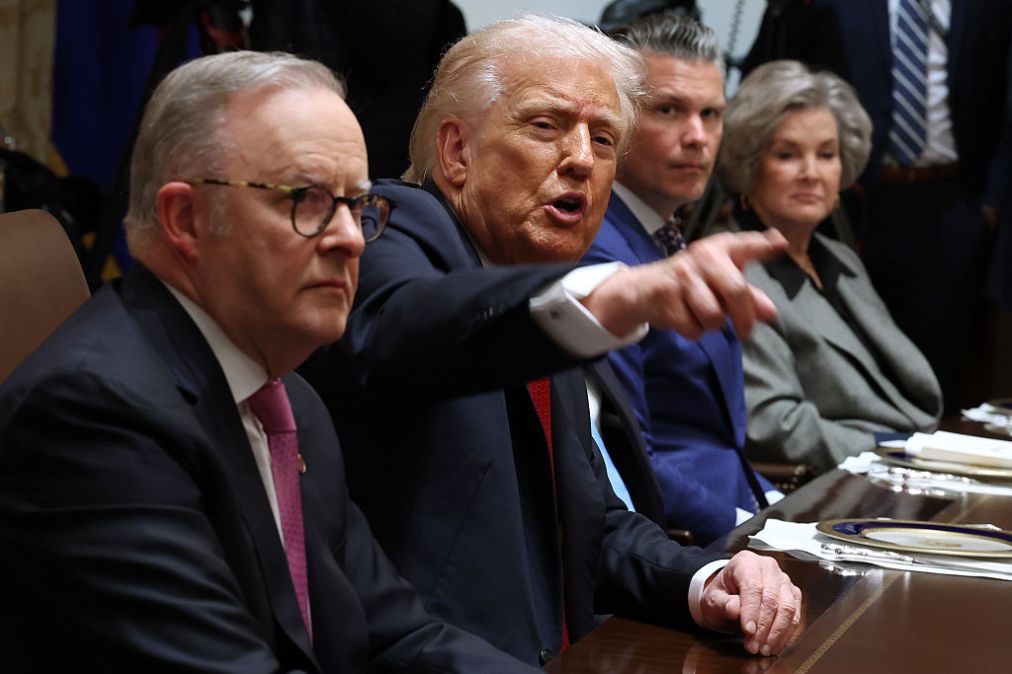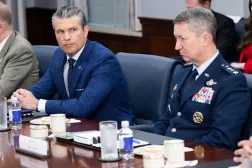Trump officially endorses AUKUS at White House meeting with Australian prime minister

President Donald Trump reaffirmed the United States’ commitment to its trilateral AUKUS defense agreement with the United Kingdom and Australia on Monday, notably marking the first time he publicly allayed international concerns about the long-term viability of that major security pact.
During his formal sit-down meeting with Australia’s Prime Minister Anthony Albanese at the White House, the two leaders discussed AUKUS’s role as a key deterrent to potential Chinese aggression in the Indo-Pacific and unveiled a new plan for their countries to invest in a wide range of materials that are essential for existing and emerging defense assets.
“We’ve been working on that for quite a while. In about a year from now, we’ll have so much critical minerals and rare earths that you won’t know what to do with them. They’ll be worth about $2. But in the meantime, we’re working with Australia and other countries,” Trump said. “We’re really working on anything having to do with military — military protection, military ships, vehicles, guns, ammunition, everything, the whole thing.”
According to a fact sheet from the White House, the two governments intend to put more than $3 billion together in critical mineral projects within the next six months.
At the press briefing alongside Trump, Albanese said that ultimately, “this is an $8.5 billion pipeline that we have ready to go.”
Since the 1990s, China has been moving to assert and keep hold of its current global dominance in both the mining and processing of critical minerals and rare earth materials, which are necessary components for computer chips, vehicles and other in-demand military equipment.
Ahead of the White House meeting Monday, questions were swirling about whether the U.S. would continue to participate in the AUKUS security pact under Trump’s leadership.
Originally launched under the Biden administration in 2021, AUKUS permits the three nations to collectively and simultaneously advance their weapons arsenals, improve interoperability of systems and counter China’s extensive military forces in the Indo-Pacific region.
The trilateral alliance is currently divided into two primary elements or “pillars.” Pillar 1 is designed to support Australia’s acquisition of a conventionally armed, nuclear-powered submarine capability, while Pillar 2 aims to enhance cooperation to speed up access to other advanced technologies with defense applications, such as artificial intelligence.
News surfaced at the beginning of Trump’s second term that the Pentagon was reviewing the agreement to ensure it adhered to his administration’s “America First” approach.
“On defense, we’ve already had a discussion about taking it to the next level. Our defense and security partnership with AUKUS is so important for us — and I thank you for the support that the administration is giving as well,” Albanese told Trump.
Defense Secretary Pete Hegseth and Navy Secretary John Phelan were among the members of the administration seated at the roundtable for the bilateral meeting.
When invited by Trump to share brief comments, Phelan said the naval facility Australia is building in the southwest that will enable a rotating force of nuclear-powered submarines is “very important to our ability to project power in the Indo-Pacific and work with allies.”
Regarding the future of the partnership, specifically, Phelan said: “I think what we’re really trying to do is take the original AUKUS framework and prove it for all three parties, and make it better, and clarify some ambiguity that was in the prior agreement — so, it should be a ‘win-win’ for everybody.”
The senior officials did not provide further details about how AUKUS might be re-worked in the near term.
Tensions between China and Taiwan have been on the rise — particularly since Chinese President Xi Jinping revealed his intent to ensure that the People’s Liberation Army would be prepared and equipped to “unify” (or invade) its smaller neighbor by 2027.
That’s also the year U.S. nuclear submarines are scheduled to start rotating through Western Australia.
In response to reporters’ questions, Trump noted that he viewed the AUKUS deal as a China deterrent. “But, I don’t think we’re going to need it,” the president added.
“We are way ahead of China militarily. The United States, we’re way ahead of them in every form of military — other than they’re building a lot of ships — and we’ll have that started. We’ll be catching them on that,” Trump noted. “We’re way ahead of China on AI, and we’re way ahead of China militarily. From the standpoint of sophisticated weapons, we have weapons that a lot of people don’t even know about.”
The president confirmed tentative plans to meet with Chinese President Xi Jinping at the Asia-Pacific Economic Cooperation summit later this month in South Korea, and also mentioned that he will take his counterpart up on a recent invite to travel to China “fairly early next year.”
Both are threatening tariffs of more than 100% on the other’s goods unless they agree to a new trade agreement before Nov. 1.
“If we make a deal, that’s great. If we don’t make a deal, a lot of people are going to be paying a big price,” Trump said.






